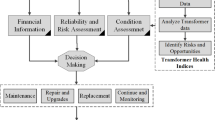Abstract
Accurate identification of incipient cable fault is helpful to improve the reliability of power system. This paper proposes an incipient fault identification method for distribution networks cables based on feature matching of power disturbance data. Firstly, based on the power disturbance data provided by the power quality monitor about the incipient faults, a characteristic analysis is performed, and three characteristics F1 to F3 that can distinguish the incipient faults of the cable are extracted. Then, the common abnormal condition of 10 kV system is simulated, and the feature quantity is extracted to establish the feature database. Finally, a topic search algorithm is used to perform correlation matching, so as to quickly and accurately identify incipient cable faults from a variety of abnormal conditions. This method can be used to predict cable faults and evaluate the health status, while providing system operation engineers and dispatchers with advanced situational awareness and the causes of impending failures to reduce accident losses and hazards. Simulation results show that the proposed method has high accuracy.












Similar content being viewed by others
Data Availability
All data, models, and code generated or used during the study appear in the submitted article.
References
Sidhu TS, Xu Z (2010) Detection of Incipient Faults in Distribution Underground Cables. IEEE Trans Power Delivery 25(3):1363–1371
Zhang C, Wang JD, Huang J, Cao PF (2020) Detection and classification of shortcircuit faults in distribution networks based on Fortescue approach and Softmax regression. Int J Electr Power Energy Syst 118:105812
Zhang WH, Xiao XY, Zhou K, Xu WS (2017) Multi-cycle incipient fault detection and location for medium voltage underground cable. IEEE Trans Power Delivery 32(3):1450–1459
Ghanbari T (2015) Kalman filter based incipient fault detection method for underground cables. IET Gener Transm Distrib 9(14):1988–1997
Chi B, Zhang Z, Liang R (2020) A CNN recognition method for early stage of 10 kV single core cable based on sheath current. Electr Power Syst Res 184:106292
Jannati M, Vahidi B, Hosseinian SH (2019) Incipient faults monitoring in underground medium voltage cables of distribution systems based on a two-step strategy. IEEE Trans Power Delivery 34(4):1647–1655
Liu N, Fan B, Xiao X, Yang XM (2019) Cable incipient fault identification with a sparse autoencoder and a deep belief network. Energies 12(18):3424
Zhai JQ, Chen MY, Hu G, Lang ZQ (2013) Incipient fault classification using a combination of S-transform and Hilbert transform method. Eur Trans Electr Power 23(1):122–134
Guo MF, Yang NC, You LX (2018) Wavelet-transform based early detection method for short-circuit faults in power distribution networks. Int J Electr Power Energy Syst 99:706–721
Bretas AS, Ricardo HO, Orozco CA, Lurinic L (2017) Incipient fault location method for distribution networks with underground shielded cables: A system identification approach. Int Trans Electr Energy Syst 27:e2465
Zhang WH, Tang TH, Yin XL (2016). The arcing fault based multi-cycle incipient fault detection for underground cable. C // China International Conference on Electricity Distribution. IEEE
Kim CJ, Lee SJ, Kang SH (2004) Evaluation of feeder monitoring parameters for incipient fault detection using laplace trend statistic. IEEE Trans Ind Appl 40(6):1718–1724
Ding B, Fang H (2017) Fault prediction for nonlinear stochastic system with incipient faults based on particle filter and nonlinear regression. ISA Trans 68:327–334
Ji H, He X, Shang J, Zhou DH (2017) Incipient fault detection with smoothing techniques in statistical process monitoring. Control Eng Pract 62:11–21
Ge W, Wang J, Zhou J, Jin QB (2015) Incipient fault detection based on fault extraction and residual evaluation. Ind Eng Chem Res 54(14):3664–3677
Huang DR, Ke LY, Mi B (2018) A new incipient fault diagnosis method combining improved RLS and LMD algorithm for rolling bearings with strong background noise. IEEE ACCESS 6:26001–26010
Zhai JQ, Chen MY, Hu G (2013) Incipient fault classification using a combination of S-transform and Hilbert transform method. Eur Trans Electr Power 23(1):122–134
Equbal MD, Khan SA, Islam T (2018) Transformer incipient fault diagnosis on the basis of energy-weighted DGA using an artificial neural network. Turkish J Electr Eng Comput Sci 26:77–88
Chen H, Jiang B, Lu N (2018) An improved incipient fault detection method based on Kullback-Leibler divergence. ISA Trans 79:127–136
Zhang C, Peng K, Dong J (2020) An incipient fault detection and self-learning identification method based on robust SVDD and RBM-PNN. J Process Control 85:173–183
Zhu K, Song X, Xue D (2013) Incipient fault diagnosis of roller bearings using empirical mode decomposition and correlation coefficient. J Vibroengineering 15(2):597–603
Zhang C, Liu S, Gao Y, Zhang ZS, Baltagi S (2018) Adaptive fuzzy control for multiple sliding modes in multi-infeed AC/DC transmission systems. J Intell Fuzzy Syst 35(4):4163–4172
Wang Y, Lu H, Xiao XY et al (2020) Cable incipient fault identification using restricted Boltzmann machine and stacked autoencoder. IET Gener Transm Distrib 14(7):1242–1250
Furlani BA, Santoso S (2019) Condition monitoring of circuit-switchers for shunt capacitor banks through power quality data. IEEE Trans Power Delivery 34(4):1499–1507
Russell BD, Benner CL (2010) Intelligent systems for improved reliability and failure diagnosis in distribution systems. IEEE Trans Smart Grid 1(1):48–56
Yang Y, Wang X, Liu X (2019) A new incipient fault monitoring method based on modified principal component analysis. J Chemom 33(10):1–13
Kulkarni S, Santoso S, Short TA (2014) Incipient fault location algorithm for underground cables. IEEE Trans on Smart Grid 5(3):1165–1174
Mousavi MJ, Butler-Purry KL (2010) Detecting Incipient faults via numerical modeling and statistical change detection. Power Delivery IEEE Trans 25(3):1275–1283
Zhang C, Gong MF, Zhang YJ, Li YX (2015) Multiple-period repetitive controller for selective harmonic compensation with three-phase shunt active power filter. J Power Electron 15(3):819–829
Yeh CCM, Zhu Y, Ulanova L, Begum N. Matrix Profile I (2016) All Pairs Similarity Joins for Time Series: A Unifying View That Includes Motifs, Discords and Shapelets. C //2016 IEEE 16th International Conference on Data Mining (ICDM) IEEE
Kizilcay M, Seta P (2005) Digital simulation of fault arcs in medium-voltage distribution networks. In: 15th PSCC pp 22–26.
Whaite S, Grainger B, Kwasinski A (2015) Power quality in DC power distribution systems and microgrids. Energies 8(5):4378–4399
Yang Y, Yueming J, Xiyuan P (2018) Multi-frequency test generation for incipient faults in analog circuits based on the aliasing measuring model. IEEE Access 6:34724–34735
Harmouche J, Delpha C, Diallo D (2014) Incipient fault detection and diagnosis based on Kullback–Leibler divergence using principal component analysis: Part I. Signal Process 94(1):278–287
Harmouche J, Delpha C, Diallo D (2015) Incipient fault detection and diagnosis based on Kullback-Leibler divergence using principal component analysis: Part II. Signal Process 109(1):334–344
He Z, Shardt YAW, Wang D (2018) An incipient fault detection approach via detrending and denoising. Control Eng Pract 74:1–12
Acknowledgments
The authors acknowledge the financial support from National Natural Science Foundation of China under Grants 61803233, China Postdoctoral Science Foundation (2018M640645), Qingdao Science and Technology Project (19-6-2-65-cg), SDUST Young Teachers Teaching Talent Training Plan (BJRC20180504).
Author information
Authors and Affiliations
Corresponding author
Ethics declarations
Conflict of interest
The authors declare that they have no known competing financial interests or personal relationships that could have appeared to influence the work reported in this paper.
Additional information
Publisher's Note
Springer Nature remains neutral with regard to jurisdictional claims in published maps and institutional affiliations.
Rights and permissions
About this article
Cite this article
Zhang, C., Song, N. & Li, Y. Incipient fault identification of distribution networks based on feature matching of power disturbance data. Electr Eng 103, 2447–2457 (2021). https://doi.org/10.1007/s00202-021-01232-6
Received:
Accepted:
Published:
Issue Date:
DOI: https://doi.org/10.1007/s00202-021-01232-6




